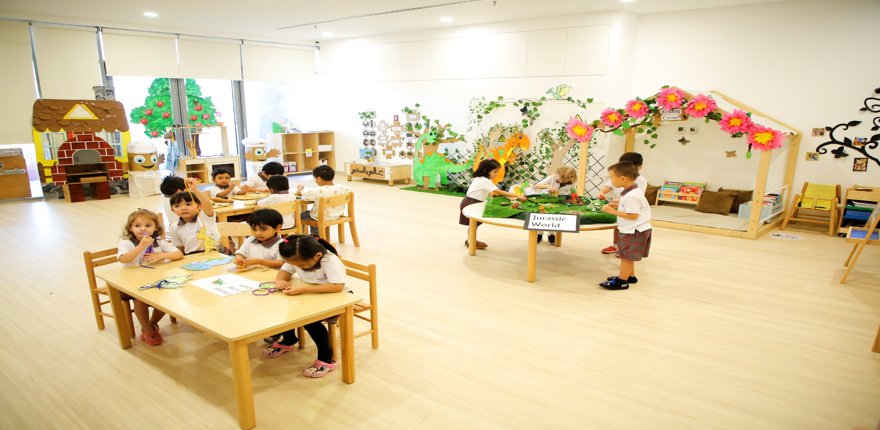How to Set a Preschool Morning Routine ? Build a morning routine for kids in 6 Steps
- July 04, 2025
- preschool

Why a Consistent Preschool Morning Routine Matters for Kids? A consistent preschool morning routine helps kids navigate daily tasks with less stress. Simple steps like brushing their teeth and getting dressed give their day structure and promote teamwork. These easy habits build a sense of stability, so children arrive at preschool feeling calm, prepared, and confident. Over time, completing small tasks fosters independence and a lasting sense of accomplishment.
Steps to Build a Preschool Morning Routine for Kids
1. Start with a Predictable Wake-Up Routine for Kids
Before your child even gets out of bed, the morning sets the tone for the entire day. A fixed wake-up time creates consistency, promotes better sleep, and reduces chaos. This steady rhythm is essential to any successful morning routine for kids, helping them ease into early tasks calmly.
Set the same wake-up time each day
A consistent start supports natural sleep patterns, improves rest, and helps kids wake up refreshed.Create a calm and cheerful morning space
Use soft lighting and remove distractions. A peaceful environment helps reduce tantrums and starts the day on a positive note.Limit screen time during the preschool morning routine
Screen-free mornings help kids stay focused and upbeat. They’re more likely to engage in creative play and less likely to be irritable.
2. Let Kids Help the Night Before to Simplify Mornings
Involving kids in bedtime prep makes your preschool morning routine easier. When children help prepare, they know where everything is and feel more responsible. Simple tasks like laying out clothes or packing bags reduce stress and create smoother mornings. It also teaches that relaxed mornings begin with thoughtful evenings.
Pack the preschool bag together
Have your child pack items like snacks or comfort toys to reduce morning clutter.Lay out clothes and shoes before bedtime
Seeing their full outfit ready helps eliminate decision stress and saves precious minutes.Discuss the next day’s preschool daily schedule
Talk about upcoming activities, snack breaks, or story time. This helps your child sleep better and wake up feeling secure.
3. Use Visual Schedules to Guide Morning Routine for Kids
Young children benefit from seeing what comes next. Visual aids, like charts or picture-based checklists, break down the preschool morning routine into manageable steps. These tools help non-readers stay on task without needing constant reminders, making the routine smoother and more collaborative.
Create a morning checklist with stickers or charts
Kids love marking off tasks; it turns routine into a fun challenge.Add picture icons for non-readers
Visual cues help children follow steps independently, improving understanding and focus.Review the visual schedule each morning
Repetition builds predictability, easing preschool anxiety and reinforcing daily habits.
4. Build Time Buffers Into Your Preschool Morning Routine
Delays are part of life with little kids. Adding buffer time keeps the morning routine for kids stress-free and allows space for slower moments. Planning extra minutes for each task helps your child feel calm and gives you flexibility to handle anything unexpected.
Add extra time for brushing and dressing
Kids need space to move at their own pace. Giving them more time helps build independence without pressure.Plan breakfast to be unhurried and relaxed
Slow breakfasts let kids wake up fully, enjoy their food, and talk with family.Avoid rushing to support smoother preschool transitions
A few quiet moments for shoe-tying or a quick chat ease the shift from home to school.
5. Include Positive Connection Moments in the Morning
Warm, positive moments can shape your child’s entire day. Whether it’s a hug, joke, or short chat, these small gestures offer emotional security and motivation. These moments of connection improve cooperation during tasks and make the preschool morning routine feel less like a checklist and more like a team effort.
Have simple bonding routines (snuggles, fun chats)
Just a minute of closeness can help kids feel emotionally ready to take on the day.Support independence with encouragement
Use gentle reminders, not strict commands. This boosts confidence and fosters participation.Praise morning wins to build confidence
Celebrate little victories, like zipping a coat or eating breakfast, to reinforce pride and self-belief.
6. Make Preschool Transitions Easy and Uplifting
Preschool transitions, moving from home to school, can be tough. A loving send-off sets the tone for a successful day. Using consistent goodbye routines helps kids feel secure, while small rituals reinforce trust and comfort.
Offer calm, reassuring goodbyes
Keep drop-offs quick, kind, and predictable. A short hug and a promise to return can ease nerves.Create custom goodbye rituals
Let your child choose a goodbye routine, like a high five, rhyme, or wave, that gives comfort.Stick to a consistent drop-off flow
Regular drop-offs build trust and help your child feel confident about their preschool daily schedule.
Conclusion:
A calm, consistent preschool morning routine sets up kids (and parents) for a smoother day. With clear wake-up times, bedtime prep, and visual schedules, children know what to expect. Connection moments build emotional security, and time buffers remove panic. Most importantly, positive preschool transition ideas, like cheerful goodbyes and structured drop-offs, help children feel safe and ready. When mornings are organised, everyone walks out the door with a smile.



